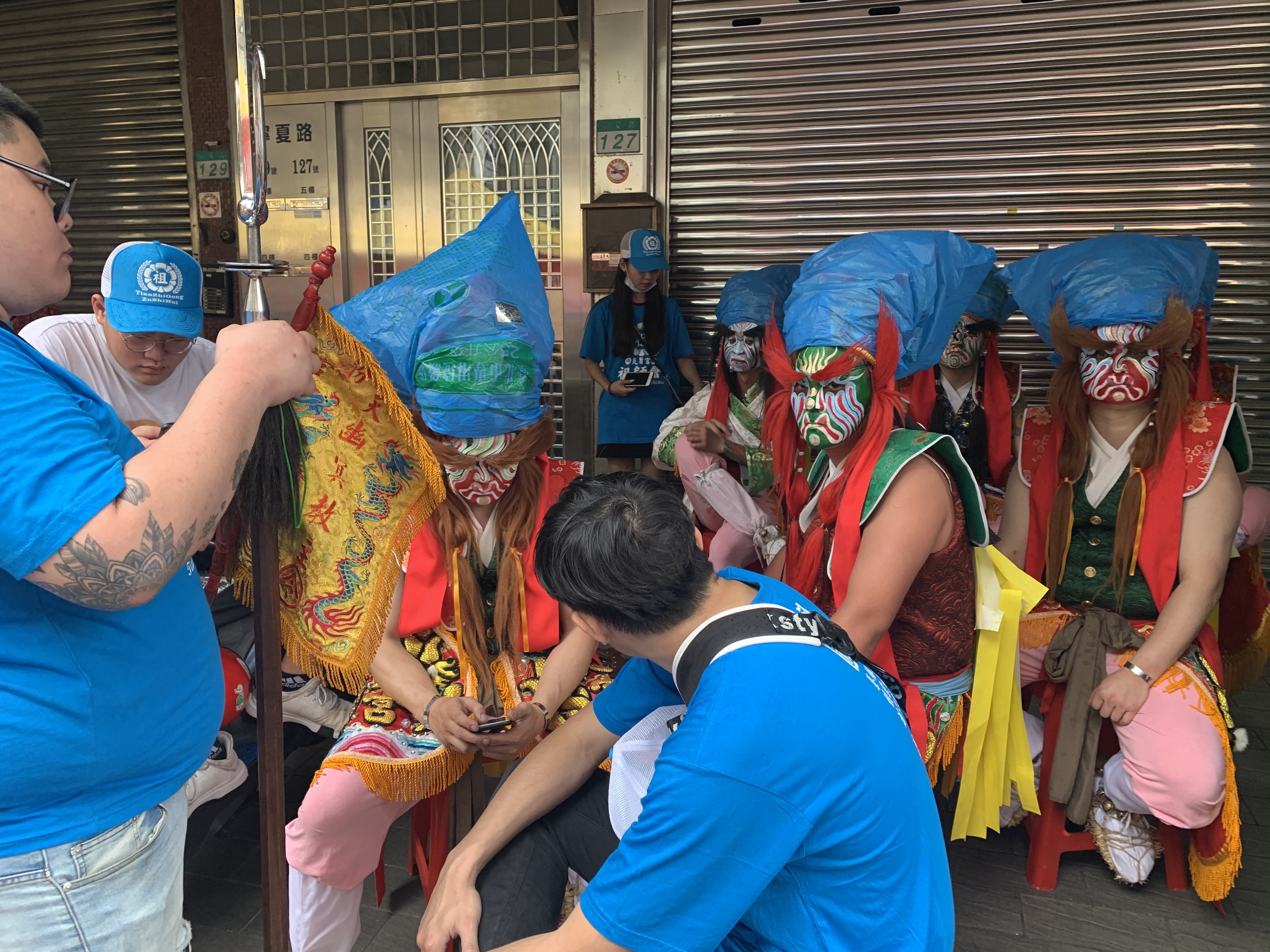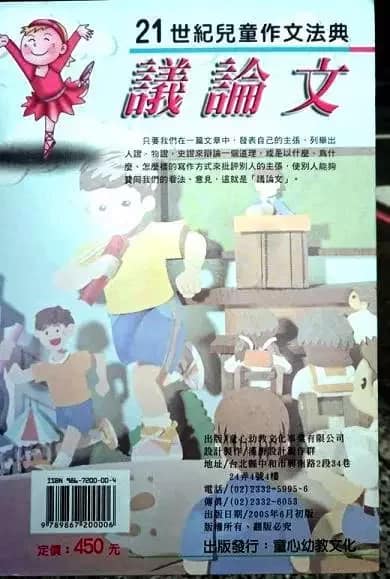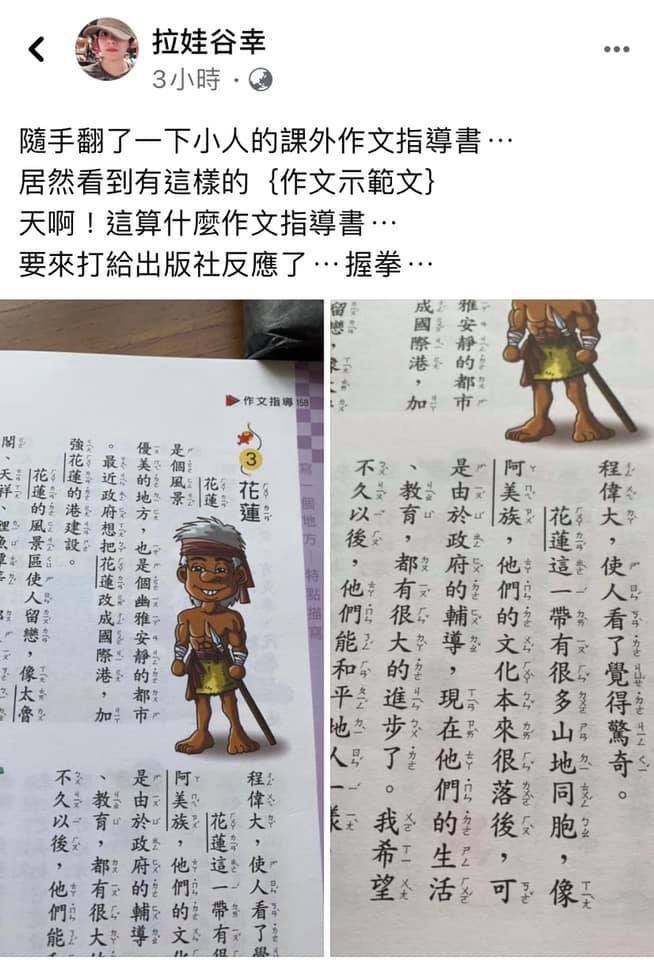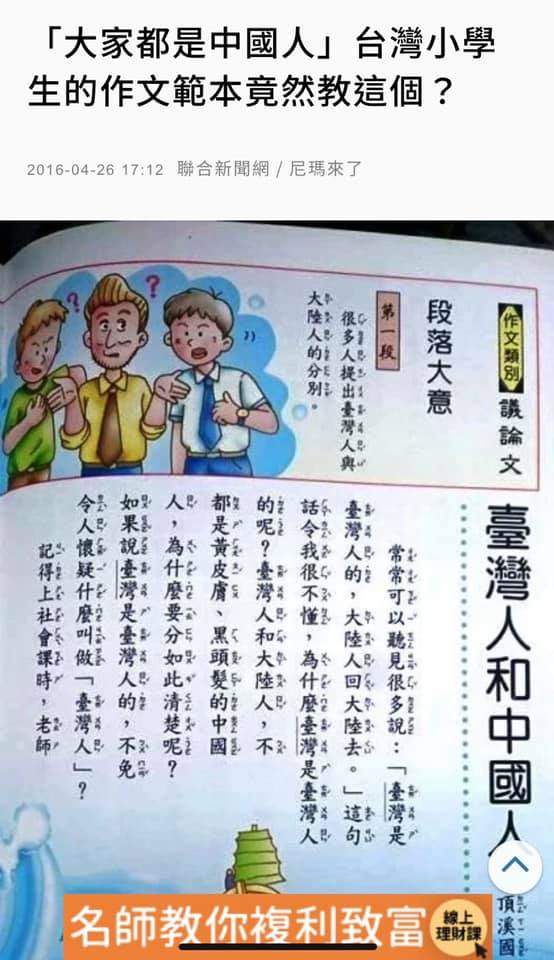I dunno, this just seemed like a good photo to illustrate the current debate around Bilingual by 2030
There is an ongoing series of interesting and worthwhile dialogues in Taipei affiliated with Fulbright and Taiwan NextGen which include discussions of the Bilingual by 2030 initiative: there's one tomorrow, (most likely today by the time you read this). Having attended the last one, I am considering returning, but I need to be available for last-minute feeback and questions for trainees who are doing their teaching demonstrations on Sunday, and I'll always prioritize them.
However, I thought this would be a good opportunity to "mythbust" some common misconceptions about Bilingual by 2030. I've noticed a lot of people believe things about it which are simply not true. Others have decided what they'd like their opinion on it to be without giving it a fair hearing: it's so tempting and easy to project one's already-extant beliefs about English being a harbinger of Big Bad Globalization onto it, without fully considering where it may have merit.
I'm not here to tell you if it's a "good" or "bad" plan, although I can say that I started out highly cynical, but was gradually won over by dedicated professionals who saw a lot of good in it, and have been doing what I can to ensure it's implemented in a thoughtful and effective way. If my mind can be changed, I hope yours can too.
"Taiwan wants to prioritize only English and Mandarin, that's why it's called 'Bilingual' by 2030"
The name "Bilingual by 2030" is certainly sub-optimal, and cringey tweets from Vice President William Ching-te Lai don't help correct the view that the plan sidelines and potentially threatens a renewed interest in local languages. I strongly suspect many negative opinions of the policy come from hearing the name and pulling a face. I agree: it sounds pretty bad. The NDC document (linked in the next section) re-iterates that Lai and others have expressed this English-Mandarin binary, however, it does not incorporate this view into the actual policy:
Side by side with implementation of the bilingual nation policy, equal importance will also be attached to the promotion of native-language culture. Taiwan in the future will be a nation of diverse ethnicities and languages.The bilingual policy will be parallel to the pluralistic development of mother tongues, and its implementation will not constrain native language education.
Having interacted with the NDC on this issue, I do believe they are a few steps ahead -- and a few notches more thoughtful -- than the government at large, but the intent is there to focus on improving language education in general, not "bilingualism".
Will this attempt to be more pluralistic and promote both English and local languages and cultures be successful? I have no idea, but this is a more egalitarian, local-context-situated take on foreign language education than I've seen from any previous policy. Frankly, it's a step forward that they thought to include it at all.
Will implementation be insufficient? Probably, and local language education is currently insufficient as well. But Bilingual by 2030 hasn't been implemented in any meaningful way yet, so it would be odd to blame it for an already-existing problem.
If this is the case, why is it labeled "Bilingual by 2030" rather than, say, "Multilingual Taiwan" (my preferred nomenclature)? Honestly, this is just thickheadedness. The plan is based on an initiative that began in Tainan when Lai was the mayor, so it's his 'baby', and to that end, it seems that the blame for this baby's unfortunate name lies with the father. I can't say much, but I happen to know that Lai was told the name was problematic by experts back when it was a city initiative; he didn't listen.
The subtleties of this do matter: the writers of the actual policy are clearly trying to do the right thing and craft a useful policy out of a cringey focus on "bilingualism". That said, they most likely don't have the power to demand a better name, because that's how power works. Understanding this is key to useful advocacy.
"Taiwan wants to make English an official language by 2030"
Other than a quick review of Lai's involvement in the policy's formation, the actual policy document addresses this one time:
With regard to promoting English as the nation’s second official language, this would be studied and discussed again after 2030, in light of the executive review of the results of the bilingual policy’s implementation.
This is most likely a polite way of saying that the government and NDC don't actually want to do this, but Lai thinks they should, so they're humoring him while putting off the actual question. I merely suspect this; I cannot confirm it. But I've been here long enough that I've hopefully gained some competence in translating "Taiwanese Governmentese" into something more comprehensible.
Whether I'm right or wrong, it's right there in plain text: perhaps the issue of making English an "official language" will be taken up in the future, but it will not happen as part of Bilingual by 2030.
"The plan is to make every citizen bilingual by 2030"
Nowhere in the actual policy does it say this. While it does list improving the English proficiency of Taiwanese citizens as a policy objective, it very wisely does not go so far as to say that the goal is for every citizen to be forced to learn English, or for everyone to be proficient in it to some degree. In terms of language education, it talks about improving the way languages are taught, without stipulating any specific outcomes. In terms of "improving proficiency", it focuses on government employees and front-line workers who interact with foreigners regularly (such as tourism and hospitality professionals). Frankly, that seems like a pretty smart focus: they're the people who would need English the most in a more international, multicultural Taiwan.
Improving the overall English proficiency of Taiwanese labor is also included, but it's important to note that none of the details of this part of the plan would force anyone to actually improve or learn English: the idea is to make online work applications, advisory services and handbooks bilingual, and encourage companies to offer English classes to employees. I've taught Business English for many years, and I can say that your average trainer in this field is more concerned with providing an environment to practice and enhance existing language skills -- which is the most optimal way to help trainees actually improve, though it's less quantifiable -- not crack the whip, administer tests and pour homework on already-overworked learners.
Indeed, much of the plan involves improving English-language government services, including improved websites, application services, financial services, procurement contracts and a whole bunch of other boring crap that really needed to have been done a decade ago. Who can argue that all of those things require improvement?
This all feeds into the actual goals of what the NDC has crafted: a plan to nudge Taiwan towards offering a more welcoming international environment, not enforcing some sort of linguistic imperialist nightmare hellscape in which not speaking English or Mandarin will earn you a paddlin'.
"The changes in education simply won't work"
Not with that attitude they won't!
Seriously, this is the area where people's concerns are the most valid. On one hand, my professional opinion is that the language learning methodology that Bilingual by 2030 promotes is sound.
You might say that's just my opinion, but I literally have a Master's in this, as I took a deep look at Bilingual by 2030 as part of my dissertation which focused on intercultural communicative competence. What's more, my primary work right now is in teacher training. If there are two things I know extremely well, they are intercultural communication and teaching methodology in the language classroom. I'm so methods, I'm post-methods, baby!
CLIL (content and language integrated learning -- careful scaffolding of the learning of subject matter in a foreign language) does have promising research behind it. It helps eliminate the issues inherent in low-content, low-context "general English" classes. When you see language learners failing to learn, common causes include sub-optimal teaching as a result of washback from inappropriate testing methods, inauthenticity (learning that doesn't prioritize or promote real communication, and is thus rendered both useless and unengaging), and insufficient exposure (extended exposure plus interaction forms the backbone of the interactionist theory of language learning -- I wrote a paper on this, but won't bore you).
Sadly, the Taiwanese education system is plagued by all three issues. CLIL might not solve the testing issue, but it does help bypass it: if you have to learn actual content in English and are tested on the content, it matters less if the exams for your language classes are inappropriate. It creates a more robust environment with more exposure and more real content in which you have to communicate authentically in order to learn. General language classes very often lack such content, either out of fear that it's "too hard", "too controversial" or "not necessary", in favor of grammar exercises, translating sentences and the occasional boring story about boring blonde kids doing boring things.
In short, if the plan is implemented the way the NDC clearly wants it to be, it actually could work. The methodology and theory behind it is sound, thoughtful and modern.
However, concerns about Bilingual by 2030's viability in classrooms are valid: there seems to be no effort to reform the examination system which plagues Taiwanese education like a relentless metastasized cancer. Focus on that instead of complaining about an approach that actually has a professional stamp of approval (and not just mine).
"It does nothing to address the wealth and urban/rural divides"
This is a legitimate concern. The policy document proffers an insufficient solution:
When the government implemented bilingual policies in the past, limitations of teachers and funding made it difficult to apply them with uniformity nationwide. But now, emerging technologies and digital learning platforms can reduce the urban-rural divide, helping children in remote rural areas enjoy the same English learning resources as their peers in cities enjoy.
Yawn. Who phoned this section in? Because it's terrible.
There is in fact a way to bridge these societal divides: training up local teachers to be not only effective CLIL and language teachers and reforming the testing system to give them the flexibility they need to teach properly, but to recruit the best among them to be trained up and mentored as trainers, able through sheer number to reach more school districts in more remote and underserved and marginalized areas. More than one person shares this goal: watch this blog for more, someday -- I hope.
Will the Taiwanese government actually do this? I hope so, but as of now it still seems to be stuck in a native speakerist "must recruit foreigners" mode. I'm not against foreign teachers coming here in general, but this particular initiative certainly won't help. It will create animosity as local teachers see they are being paid less than these newcomers who don't know the local context and don't speak any local language, there won't be enough of them to reach rural and underserved schools, there's no guarantee they will actually be trained in CLIL (most likely not), and no clear outline has been set for what they will actually do once here.
"It's 2030 is totally new and overly ambitious"
Not really. The push to "internationalize" and encourage "intercultural communication" through bolstering English classes has been at the core of the education initiatives of several administrations. At the turn of the century, English classes were introduced in elementary school, in Grade 5 and later Grade 3. Aims included “improving students’ basic communicative competence” and “addressing cross-cultural issues”. In 2015, the Ministry of Education issued new guidelines with more explicit intercultural aims, aiming to cultivate future professionals who can “effectively communicate and interact with people from different countries”. You can read all about this in Chou and Ching's Taiwan Education at the Crossroad and Lin and Byram (eds) New Approaches to English Language and Education in Taiwan, or if you know me, you can ask to borrow them.
"The turn of the century" would have been the Chen administration, though his was certainly not the first government to announce such initiatives. 2015 was the Ma administration. In fact, Bilingual by 2030 is not particularly new: it's an iteration of ongoing government initiatives.
"Bilingual by 2030 is just another iteration of the same old government initiatives"
It's not really that, either. Although it turns out I still have institutional access, I just don't have the energy right now to go and find all of those old documents. However, from my memory, they mostly stated an intention to do so, but never got very far in terms of actually changing the way languages are taught. I don't know to what extent the architects of those plans engaged professional opinions, but it doesn't seem to have been sufficient make a difference. If they had been more successful, the major exams would have been reformed by now, but they still lack any sort of communicative element; in fact, there's no speaking section at all on the English portion of the university entrance exam.
Bilingual by 2030 has some serious issues in actual implementation, and while there's a great deal of funding, it's unclear what will be done with much of it, although some of it I can say is well-spent.
If anything can change the way language is taught in Taiwan, it's something like this. If you asked me as a language teaching professional to come up with a plan to improve such classes, it would look a lot like this.
"Teachers are against Bilingual by 2030"
We don't know that; nobody seems to have asked them yet. Mostly, K-12 teachers report being willing to implement more modern, communication-based approaches, but feel they can't due to the pressures -- again -- of the exams. Anecdotally, I've interacted with a lot of teachers at the university level. Although they were mostly a self-selecting group, they seemed more enthusiastic than not. What's more, a good friend and fellow classmate who teaches in a Taiwanese junior high school reports general enthusiasm for the new plan among younger teachers. She added that the (mostly older) teachers who gripe about it are generally concerned with being encouraged to teach using new approaches which may require additional training, which is generally not a good reason to oppose new education policies. Most peers I've talked to in teacher training start out skeptical, as I did, but changed their minds after giving the plan a close read. The general consensus is that if implemented in a principled way, it has the potential to be a beneficial approach.
"We should make Taiwanese an official language instead!"
First, a quick reminder that the goal of Bilingual by 2030 is not to make English an "official language" by 2030.
Second, I strongly support bolstering Taiwanese language promotion, education and resources. I would love to see that and the other languages of Taiwan -- the many Indigenous languages and Hakka -- gain such recognition and popularity. There is an element of rediscovering local identity in this approach: as I noted in a podcast with Donovan Smith, there's an argument to be made that Mandarin, a colonial language imported from China and forced on Taiwan in some horrifically cruel ways, is about as relevant to Taiwanese identity as English, which is a part of Taiwanese history as well given the historic closeness of Taiwan and the US compared to other countries.
I am sure there are people who will hate me for saying that, but there is indeed an argument to be made. In that context, a focus on local identity is crucial, and this is one smart area for advocacy.
However, that's an argument for promoting the use of local/mother languages, not against English per se. Not everyone has to learn English, just as not everyone has to learn Hakka or Atayal. It would be great if improved teaching methods could empower learners to choose the languages relevant to them and make it easier to learn them simply because they are taught more effectively, and the teaching methods proposed in Bilingual by 2030 are promising in their efficacy.
In other words, this isn't Highlander. There can be more than one. Of course, language learning is not neutral: the tides and eddies of imperialism, colonialism and cultural supremacy vs. erasure are inherently tied to it. However, that's an after-effect of history, not the language itself. Taiwan also has the benefit of never having been colonized by an English-speaking nation, so what it means to learn English here is not quite the same as what it means in post-colonial English-speaking societies. In fact, if the primary colonial language is Mandarin, then how is English the bad guy in this context? It is in fact possible to do better.
Or as a friend put it, he once thought of English as just another agent of colonialism and thus opposed it. then he realized it was simplistic and trite to just slap the same anti-Western label on every single thing. When he talked about feeling brutalized by language learning -- "like they cut your tongue" -- he was talking about Mandarin, not English.
I know it's cool to default to hating the West, and there certainly are a lot of things to hate. But I'm not cool, so I feel confident in not hating this particular thing. We can have both the local and the global. Taiwan has accomplished more astonishing things than that; it can surely succeed if it wants to.
"Taiwan doesn't need English as a foreign language"
Many individuals probably don't, no. Learners who are not motivated to learn it would either become motivated if the learning environment were to become more authentic and communicative, or they'd continue to lack interest, in which case they would not be forced to take CLIL courses -- and that's fine too. English is not currently required for the vast majority of jobs in Taiwan, and that probably wouldn't change much.
However, as a society, I'd argue Taiwan does in fact need English, a point I've noted before. Not being particularly interested in business, I remain neutral on "international competitiveness" in industry. It's fine I guess, but it just doesn't arouse any sort of internal passion. After all, I've spent my life being surprisingly well-paid for someone who so thoroughly repudiates the idea of a corporate job.
You can talk all you want about how South Korea and Japan do just fine without high English proficiency (though it seems to me their governments push it just as much as Taiwan). However, nobody doubts the existence of Japan and South Korea as countries. Taiwan has to fight every single day for even the most basic international recognition.
To participate in that discourse, you need English. Without making a moral judgement, you just do -- I know firsthand that activists who have wanted to engage in such participation at one point felt held back by their self-perceived lack of skill in the language. Taiwan has the power, if it wants it, to appropriate English for its own ends, as a tool to fight for international recognition.
It wouldn't be the first country where learners thought to do so, either. From a student evaluation form in Palestine sometime before 2017:
We need to learn how to resist by using the Western language in order to convey our message and our voice to the whole world.
Sound familiar?
Conclusion
Hate on Bilingual by 2030 if you want, but hate on it for the right reasons. If the alternative is the way language is (mostly) taught in Taiwan now, it's honestly a huge step forward. If you want to criticize it for its proposed teaching approach, don't. Or at least, don't complain to me. If you want to complain that the government should not spend resources improving access in English to vital information and websites, what is wrong with you?
If you want to criticize it for not centering local languages enough, that's fine. But remember that this isn't an either/or situation. Use that energy to advocate for local language education and use, not against English. If you want to complain that it probably won't succeed, that's fine too, but perhaps look at the real issues with implementation: the lack of proposed reform of the major examinations, the focus on recruiting native speakers rather than training local talent, the lackluster focus on local languages despite the NDC's best intentions, and the half-assed approach to bridging the urban-rural divide. This is smarter than criticizing it because it burnishes your anti-Western cred.
This will be much easier to do if we all let go of the myths that have been built around Bilingual by 2030 and stop wasting energy talking about non-issues. There are real problems to discuss, so I propose we get to it.












